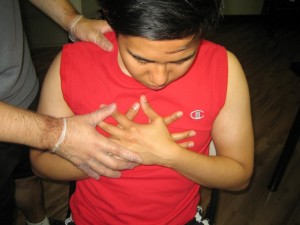Tachycardia is simply defined as a rapid heartbeat above the normal range. On average, the heart beats on a rate of 60 – 100 times per minute when a person is at rest. Tachycardia happens when the chambers of the heart beat faster – either the upper or lower chambers, or sometimes both. When the heart beats too fast, it pumps out less blood due to inefficiency resulting in increasing demand for oxygen in the blood vessels. The rate is also controlled by the electrical signals through the heart. When the heart is stimulated to produce rapid impulse, tachycardia takes place.

In some cases, tachycardia causes serious complications that can disturb normal function of the heart, can lead to heart attack due to decreased oxygen in the heart muscle, or at risk of stroke.
Tachycardia: Who are at risk?
People may be at risk of developing tachycardia if they have the following characteristics:
- Those who are above 60 years of age.
- People who have relatives with tachycardia, heart disorders
- Heart disease
- Alcohol and caffeine consumption
- High blood pressure
- Stress and anxiety
- Use of recreational drugs
Tachycardia Causes
Tachycardia is due to a disturbance in the normal electrical signals that control the pumping of the heart. There are factors that contribute to tachycardia.
- Damage of heart tissues
- Effects of medications
- Abnormalities present at birth
- Too much alcohol, smoking, cocaine and recreational drugs
- Electrolyte imbalance
- Heart disease
- Hypertension
- Hyperthyroidism
At times, the real cause of tachycardia may not be determined.
Tachycardia Signs and Symptoms
Tachycardia brings about decrease in oxygen level to blood vessels due to increased pumping of the heart resulting to its poor function. The signs and symptoms of tachycardia may be as follows:
- Increased heart rate
- Chest pain
- Confusion
- Dizziness
- Low blood pressure
- Shortness of breath
- Sudden weakness
- Fainting
Tachycardia Tests and Diagnosis
Your physician can diagnose you if you have tachycardia through questions regarding your symptoms and performing physical examination. Tests may also be done like:
- Blood tests
- Electrocardiogram or ECG
- Holter monitor
- Electrophysical testing or EP studies
- Tilt-table test
- Chest x-ray
Tachycardia Treatment
There are ways to slow down or normalize the fast heart rate. The following may be considered:
- Vagal maneuvers which regulate heart beat
- Medications like anti-arrhythmic drug to restore normal heartbeat and control the heart rate.
- Cardioversion is used to deliver an electric shock to the heart
Tachycardia Complications
Complications may depend on factors like the severity, type, rate of tachycardia, duration of tachycardia, or whether or not you have heart conditions. It may include:
- Blood clots
- Heart failure
- Fainting spells
- Sudden death
Tachycardia Prevention
There are ways to prevent tachycardia that may eventually lead to heart disease or failure. The following may help:
- Live healthily through exercise and proper diet
- Maintain a normal and healthy weight
- Have your blood pressure or cholesterol levels in control
- Quit smoking
- Drink alcoholic beverages in moderation
- Do not use recreational drugs
- Reduce caffeine intake
- Manage stress
- Have a regular check-up
